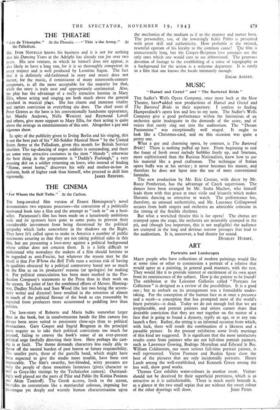" For Whom the Bell Toils." At the Carlton. THE
CINEMA THE long-awaited film version of Ernest Hemingway's novel demonstrates two separate processes—the conversion of a politically motivated book into a film and the attempt to "cash " on a best- seller. Paramount's film has been made on a luxuriously ambitious scale and its sponsors have gone to some pains to prevent their considerable investment from being threatened by the political antipathy which lurks somewhere in the shadows on the Right. They have felt called upon to make in America a number of public statements assuring us that they are not taking political sides in this film, but are presenting a love-story against a political background whose colbur does not concern them. It is a little difficult to understand why nowadays the makers of a film should hesitate to be regarded as anti-Fascist, but whatever the reason may be the result is that For Whom the Bell Tolls runs a serious risk of having its qualities obscured by a political controversy based not so much on the film as on its producers' reasons (or apologies) for making it. For political emasculation has been more marked in the Pro- duction Company's statements to the Press than in their work on the screen. In point of fact the combined efforts of Messrs. Heming- way, Dudley Nichols and Sam Wood (the last two being the screen- story writer and director) have resulted in the retention of almost as much of the political flavour of the book as can reasonably be expected from producers more accustomed to peddling love than politics.
The love-story of Roberto and Maria bulks somewhat larger than in the book, but in unadventurous hands the film camera has always been more suited to passionate close-ups than to political abstractions. Gary Cooper and Ingrid Bergman in the principal parts require us. to take their political convictions too much for granted, failing to convey the book's sense of an ever-present political urge fatefully directing their lives. Here perhaps the cast- ing is at fault. The theme demands characters less easily able to throw off the mental burden of past horror or future responsibility. The smaller parts, those of the guerilla band, which might have been expected to give the studio more trouble, have been cast impeccably. The film's swarthy, hot-blooded, witty peasants are truly the people of these mountain fastnesses (given character as well as Goya-like tintings by the Technicolor camera). Outstand- mgly well played are the parts of Pilar and Pablo (by Katina Paxinou and Akira Tamiroff). The Greek actress, fresh to the screen, bestrides its conventions like a matriarchal colossus, imposing her picaresque yet deeply and warmly human characterisation upon
the mechanics of the medium as if to the manner and matter born. The personality, too, of the loweringly fickle Pablo is presented with great skill and authenticity. How probable is the twisted, resentful egotism of his loyalty to the common cause ! T.he film is unnecessarily long, but the Cooper-Bergman love passages are the only ones which one would care to see abbreviated. The generous devotion of footage to the establishing of a sense of topography as a background for the action is a welcome departure. It is rarely in a film that one knows the locale intimately enough.
EDGAR ANSTEY.


























 Previous page
Previous page